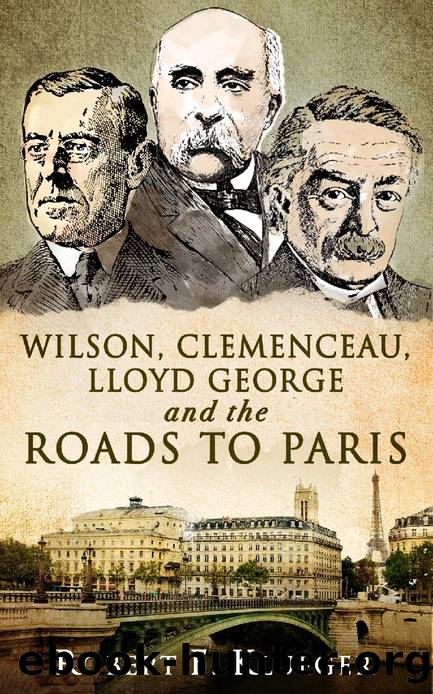Wilson, Clemenceau, Lloyd George and the Roads to Paris by Robert F Klueger

Author:Robert F Klueger [Klueger, Robert F]
Language: eng
Format: epub
ISBN: 9781736387306
Amazon: 1736387308
Publisher: Bridge & Knight Publishers, Ltd.
Published: 2021-05-17T19:00:00+00:00
15
La Voie SacrÃe
Today the word peace is a sacrilege .
âAristide Briand
W oodrow Wilson entered the White House with no experience and little interest in foreign affairs. He became president decades before the creation of the National Security Council. He had no assistant to the president for national security affairs. There were not as yet any civilian intelligence agencies. At the State Department Wilson could call on the secretaryâRobert Lansingâand a counselor; there were no undersecretaries. (By the time Franklin Roosevelt became president, he had a talented âbrain trustâ he could call upon.) But it is doubtful that Wilson would have called on any of these men had their offices then existed; Wilson preferred to work alone. He had a cabinet, but the secretaries usually learned of important policy decisions only after the fact, often from the newspapers. Only rarely did he call in men for the private chats that other presidents before and since would deem so beneficial. He dined with his family. The British ambassador, Sir Cecil Spring Rice, wrote to his Foreign Office: âThe President rarely sees anybody. He practically never sees ambassadors, and when he does, exchanges no ideas with them. Mr. Lansing is treated as a clerk who receives orders which he has to obey at once and without question.â 1 Walter Hines Page wrote of him: âHe does his own thinking, untouched by other menâs ideas. He receives nothing from the outside.â 2
The notable exception was Wilsonâs reliance on Col. House, who Wilson entrusted implicitly and to whom Wilson outsourced much of the conduct of foreign affairs. But House was every bit the amateur that Wilson was; he lived in New York City and refused to venture into the capital during the summer months. For much of 1916, Wilsonâs principal foreign policy functionaries, House and Lansing, would work at cross-purposes, confusing the Allies, as the presidential election impended, causing both the Allies and the Central Powers to suspect that Wilsonâs words and deeds were motivated by domestic politics. And all of this occurred as two of the greatest battles in human history, the French defense at Verdun and the Anglo-French offensive on the Somme, raged.
The sinking of the Lusitania did not end Houseâs goal of mediating an end to the war; it only interrupted it. In June, 1915, after House returned from Europe, he met with Wilson. They agreed that they would leave it to House to determine when it would be âpropitiousâ for House to return to Europe. They also agreed that Lansing would be a good man to replace the recently-departed Bryan as secretary of state. They considered Lansing an âoffice manâ who would leave the conduct of foreign affairs to Wilson and House.
The summer and fall of 1915 was the time of Wilsonâs intense courtship of Edith Bolling Galt. Wilson wrote her constantly, some of his letters running to twenty pages. Tumulty warned him that he might lose the election if he married Mrs. Galt so soon after Ellenâs death. Wilson ignored the advice.
Download
This site does not store any files on its server. We only index and link to content provided by other sites. Please contact the content providers to delete copyright contents if any and email us, we'll remove relevant links or contents immediately.
| Africa | Americas |
| Arctic & Antarctica | Asia |
| Australia & Oceania | Europe |
| Middle East | Russia |
| United States | World |
| Ancient Civilizations | Military |
| Historical Study & Educational Resources |
Magic and Divination in Early Islam by Emilie Savage-Smith;(1194)
Ambition and Desire: The Dangerous Life of Josephine Bonaparte by Kate Williams(1085)
Operation Vengeance: The Astonishing Aerial Ambush That Changed World War II by Dan Hampton(985)
What Really Happened: The Death of Hitler by Robert J. Hutchinson(868)
London in the Twentieth Century by Jerry White(845)
Time of the Magicians by Wolfram Eilenberger(842)
Twilight of the Gods by Ian W. Toll(811)
The Japanese by Christopher Harding(796)
Papillon by Henry Charrière(793)
Lenin: A Biography by Robert Service(779)
The Devil You Know by Charles M. Blow(777)
Twelve Caesars by Mary Beard(765)
Freemasons for Dummies by Hodapp Christopher;(747)
The Churchill Complex by Ian Buruma(729)
Napolean Hill Collection by Napoleon Hill(701)
The Enlightenment by Ritchie Robertson(690)
Henry III by David Carpenter;(686)
Bohemians, Bootleggers, Flappers, and Swells: The Best of Early Vanity Fair by Bohemians Bootleggers Flappers & Swells- The Best of Early Vanity Fair (epub)(681)
The Rise and Triumph of the Modern Self by Unknown(654)
